

The limitations of Steven Pinker’s optimism. Enlightenment Now: The Case for Science, Reason, Humanism, and Progress Steven Pinker Viking: 2018.
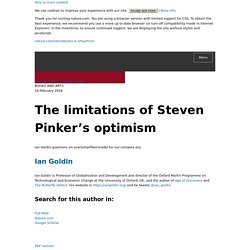
Steven Pinker’s Enlightenment Now builds on his 2011 The Better Angels of Our Nature (Viking) in offering another engaging, compelling set of reasons to be cheerful. A Peasant vs The Inquisition: Cheese, Worms and the Birth of Micro-history. Edward III of England. 14th-century King of England and Duke of Aquitaine King of England Edward III (13 November 1312 – 21 June 1377) was king of England and Lord of Ireland from January 1327 until his death; he is noted for his military success and for restoring royal authority after the disastrous and unorthodox reign of his father, Edward II.

1776, a Year of Illusions, or of Diabolical plans? - Advertisement - This is a book review of Novelist, Thomas Fleming's book "1776 the Year of Illusions" Mr.

Fleming's novelistic rendition of one year of the "so-called" American Revolution, is simply beautifully written. And despite its forgivable flaws, not the least of them being that by restricting the revolution to a single year, he ensures that the rich indispensable geopolitical context of the time would be left out. It nonetheless makes a valuable and unforgettable contribution to American history generally, and to revolutionary literature in particular. Frederick II, Holy Roman Emperor. Printing press. For the history and technology of movable type, see Movable type.
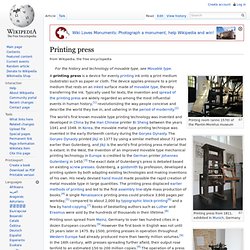
Printing room (anno 1570) of the Plantin-Moretus museum Printing press from 1811, exhibited in Munich, Germany A printing press is a device for evenly printing ink onto a print medium (substrate) such as paper or cloth. The device applies pressure to a print medium that rests on an inked surface made of movable type, thereby transferring the ink. Typically used for texts, the invention and spread of the printing press are widely regarded as among the most influential events in human history,[1] revolutionizing the way people conceive and describe the world they live in, and ushering in the period of modernity.[2] Printing soon spread from Mainz, Germany to over two hundred cities in a dozen European countries.[9] However the first book in English was not until 25 years later in 1475.
History[edit] Block printing first came to Christian Europe as a method for printing on cloth, where it was common by 1300. Peace of Westphalia. The Peace of Westphalia was a series of peace treaties signed between May and October 1648 in Osnabrück and Münster.
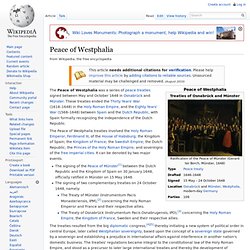
These treaties ended the Thirty Years' War (1618–1648) in the Holy Roman Empire, and the Eighty Years' War (1568–1648) between Spain and the Dutch Republic, with Spain formally recognizing the independence of the Dutch Republic. The Peace of Westphalia treaties involved the Holy Roman Emperor, Ferdinand III, of the House of Habsburg; the Kingdom of Spain; the Kingdom of France; the Swedish Empire; the Dutch Republic; the Princes of the Holy Roman Empire; and sovereigns of the free imperial cities.
It can be denoted by two major events. The treaties did not restore peace all throughout Europe, however, as France and Spain remained at war for the next eleven years, but they did create a basis for national self-determination. Locations[edit] Delegations[edit] Results[edit] Internal political boundaries[edit] 40 maps that explain the Roman Empire. By Timothy B.
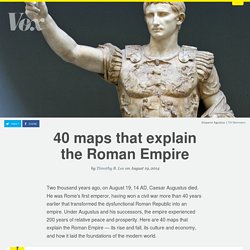
Lee on August 19, 2014 Two thousand years ago, on August 19, 14 AD, Caesar Augustus died. He was Rome's first emperor, having won a civil war more than 40 years earlier that transformed the dysfunctional Roman Republic into an empire. Canada’s forgotten independence day. Our neglect of our history being what it is, March 11 won’t signify much to most Canadians.

It’s March 17 that gets all the notoriety and all the boozing. But while there’s no problem with raising a glass to the patron saint of Ireland, Tuesday’s date should be a greater day of celebration in this country. March 11, 1848, was the day when Canada’s united colonies got responsible government. You might go so far as to call it our independence day – the day real democracy arrived. Map of Europe: 1000 AD to present day. François Quesnay. François Quesnay (French: [fʁɑ̃swa kɛnɛ]; June 4, 1694 – December 16, 1774) was a French economist of the Physiocratic school.[1] He is known for publishing the "Tableau économique" (Economic Table) in 1758, which provided the foundations of the ideas of the Physiocrats.[2] This was perhaps the first work to attempt to describe the workings of the economy in an analytical way, and as such can be viewed as one of the first important contributions to economic thought.
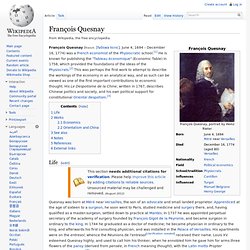
His Le Despotisme de la Chine, written in 1767, describes Chinese politics and society, and his own political support for constitutional Oriental despotism.[3] Life[edit] He now devoted himself principally to economic studies, taking no part in the court intrigues which were perpetually going on around him. Around 1750 he became acquainted with Jean C. M. Quesnay married in 1718, and had a son and a daughter; his grandson by the former was a member of the first Legislative Assembly. Works[edit] Tableau économique See also[edit] Modernity.